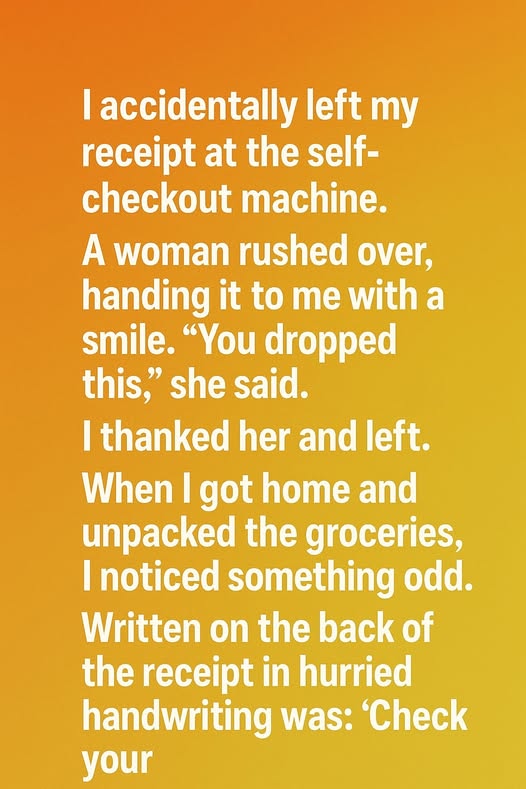I didn’t notice the receipt at first. Self-checkout spits out so many little slips—paper tails that flutter and make you feel like you’ve accomplished something even when you’ve only survived the fluorescent jungle. I was still juggling a carton of eggs and trying not to crush the bread when I felt a tap on my elbow.
“Excuse me—hey! You dropped this.” A woman with wind-reddened cheeks held my receipt like a tiny white flag. Her smile was quick, almost apologetic, as if she was worried I would think she was intruding.
“Oh! Thanks,” I said, grabbing it one-handed while tucking the eggs deeper in my tote. We did that human thing of stepping left, then right, then laughing when we mirrored each other. She had a metal cart with a single hydrangea plant riding in the basket, its leaves dusted with soil, the blue flower looking like a small storm cloud. I remember thinking—that’s an odd February purchase, and then immediately envying the kind of hope it takes to buy a blooming plant in the dead of winter.
Outside, the air knifed clean and cold through the sliding doors. The parking lot was a mess of sun-glare and slush; cars idled with puffs of exhaust that looked like the store itself was sighing. I shoved the receipt in my bag between a nest of pens and found pockets of heat on my cheeks where the woman’s kindness had landed. Then I was balancing oranges and milk and a week’s worth of spinach like a shaky Tetris master, popping my trunk, trying not to let the reusable bags slide out.
By the time I shut the trunk, I’d forgotten about her.
It wasn’t until later that night, after the low hum of the day thinned into the softer buzz of my apartment’s old fridge, that I handled the receipt again. The groceries were a chorus of small chores—rice into the jar, apples in the crisper, a ceremonial nudge of the chocolate bars behind the oatmeal so I could pretend they’d be safe there. My phone vibrated on the counter with a text from my sister—Mom says hi and asks if you still have her mixing bowl—and I smiled at the mental image of my mother keeping a ledger for all her kitchenware like a librarian for bowls.
When I finally tossed my coat on the chair and emptied my bag, the receipt floated down last, more felt than seen. I almost crumpled it into the recycling, but something about the heft made me pause. Someone had written on the back—quick, slanted handwriting that looked like it was racing the checkout beeps: Check your back seat.
My heartbeat tripped into high gear. For one disorienting second, every true-crime podcast I’d listened to surged forward in my brain like a chorus of anxious aunties. Check your back seat meant, in the urban legend I hadn’t realized I’d memorized, a man crouched behind you with a knife. I actually laughed—a small broken sound—at the ridiculousness of me, standing in my kitchen with a bag of rice like it could be a weapon.
Still, fear outfits itself in practical shoes. I grabbed my keys. I told myself there were a dozen ordinary explanations: I’d dropped something and she’d noticed; a zucchini had jumped its bag and gone for a ride. The hall light flickered when I stepped into it—the building’s special effect, part haunted, part neglected. The stairwell smelled like laundry soap and someone’s dinner. When I opened the front door, February breathed in my face again.
My car sat under the streetlight like a patient animal. The receipt warmed slightly in my fist as if it were reminding me to be careful. I pressed the unlock button; the taillights gave a polite blink; a neighbor’s dog barked once, then, deciding I wasn’t interesting, went silent.
“Okay,” I said out loud to the night, to my thumping heart, to the real world stubbornly containing both danger and kindness. I opened the back door slowly.
There, in the dim light, tucked into the corner where fabric meets floor, was my wallet. The leather looked darker in the shadows, like it was trying to play innocent. For a second I felt the phantom of the morning: me, at the kitchen table, tearing the cushions off chairs, swearing softly when my card didn’t appear. I’d decided I must have left it at home and jammed a different card in my pocket before heading out; even then, I’d had that nagging feeling on the drive like a word on the tip of my tongue.
And here it was. The whole version of a problem I’d been standing halfway in. I reached in, the cold vinyl of the seat biting my wrist, and pulled it free. The weight of it was wider than the wallet—a wave of relief, a sweet tingling embarrassment, the dizzy gratitude that fills you when the worst thing you predicted doesn’t happen.
The woman must have seen it when I was loading groceries. Maybe she’d tried to call out but the cart wheels squealed, or the automatic doors swallowed her voice, or I’d been too busy in my head, building grocery lists inside of grocery lists. So she wrote. She wrote fast, and she pressed the paper into my hand as if the message were more important than the messenger.
A small, ordinary thing. And it re-ordered my whole day.
I went back upstairs and sat in the quiet with my wallet on the table, the receipt beside it like they were a pair. While the kettle warmed, I pulled out my ID, my cards, the photo of my dad with his arm slung over a picnic chair grinning like he’d invented summer, the movie stubs I kept because sometimes you have to keep proof you made time for joy. It wasn’t that I couldn’t have canceled cards or recovered IDs. It wasn’t even about the cash. It was that, lately, I’d been barely holding the seam of my life together. And a stranger had stitched it a little for me.
I couldn’t shake the urge to find her and say thank you properly. The next day, I drove back to the store. In daylight, the self-checkout corral felt more like a corral and less like a confused airport. I scanned the faces. I watched a tall kid in a beanie help an older man wrestle a case of water onto a cart. I scoped the potted plant section, in case the hydrangeas had become a clue. The manager—gray ponytail, sneakers that squeaked when she pivoted—asked if I needed anything; I told her probably not, but did she have a corkboard where people posted lost-and-found notes? She pointed to a bulletin near the exit.
I wrote a thank-you on a neon sticky note—To the woman with the hydrangea who handed me my receipt: you saved me hours of panic. Coffee on me if we ever cross paths again.—and taped it up. I felt a little foolish and a little lit up.
No one contacted me. But the note did something too: it trained my eyes on the small traffic of kindness in the aisles. That third place women take up when they reach to the highest shelf for someone shorter. The way a man at the deli counter noticed a forgotten bag and jogged after its owner. The slow, patient way the cashier with the forearm tattoo bagged canned soups for a customer who had the shaking hands of a hard week.
I kept the receipt. It lingered on my fridge for a while, like a visiting relative. It made me behave differently.
A few days later, I was in line at a coffee shop behind a man who was patting all his pockets with increasing panic. “Shoot,” he said to the barista, flushing. “I left my wallet in the car. Can you just—hold this?”
He looked like someone whose morning had already broken in three places. I thought about the quick handwriting, the curve of the S in “Check,” the way kindness had moved through me like current. “I’ve got it,” I said. “Your coffee.” He stared for a second, then nodded, blinking too fast. “I’ll—next time, I’ll…” and he never finished the sentence because there isn’t a graceful way to say what we’re trying to say: that being seen—especially in the smallest, most unglamorous moment—feels like a landed plane.
On a windy Wednesday, a mitten lay in the gutter outside my building, tiny and blue, the kind that looks like it belongs to a hand still learning the world. I tucked it into the knob of the lobby door, mitten-side out like a flag that says someone is claimed here. That afternoon, it was gone.
On a rainy Saturday, I was loading cat litter into my trunk when a car two rows over refused to turn over. A dad with a car seat in the back and a look on his face like he was timing his whole day on a single elastic band stood scowling at his engine. I didn’t know anything about cars, but I did have jumper cables, relics of my father’s view that no errand was too small to dress like a road trip. We figured it out together. He said, “I owe you,” that manly way of saying he’d learned something about the neighbors of his life.
None of it was grand—no viral videos, no orchestra swell when the coffee went through. But the receipts of it added up.
Sometimes, when I tell people the story now, someone laughs lightly at the horror-movie version that flashed through me—Check your back seat!—and I laugh with them, because it’s always a little funny how we carry a library of shadowy warnings inside us. But privately, I think about the other kind of warning: the gentle one. The tap on the elbow from the universe that says, Wake up. Take a look. Don’t miss your own life sitting there in the back seat, quieter than fear, waiting for you to claim it.
Weeks later, at the farmer’s market, I saw her. Not in the store, not under fluorescent lights, but on the block where they sell honey and suspiciously perfect tomatoes, where the air smells like cinnamon and onions and perfume. She was holding a toddler’s hand and a bag of apples. The hydrangea was nowhere in sight, but I recognized the exact tilt of her head when she listened—a slight squint, as if she weighed your words like fruit.
“Hi,” I said, approaching carefully the way you do when you’re not sure you’re remembering a moment right. “Were you at the grocery store last month? Did you… hand me a receipt?”
She paused, then laughed. “Do I owe you an apology? I basically chased a stranger with paper.”
“You saved my day,” I said. “And my wallet.” I told her about the note, and how the words rushed me out into the cold in my socks, and how my wallet had been there like a guilty dog. I told her she had no idea what had been going on in my head that week, how that little act sent a ripple through the pond of it.
She blushed and shook her head. “It was nothing. I saw it and panicked on your behalf. My mom always says, ‘If you can fix a problem in under a minute, do it.’ But I couldn’t catch you, so—” she mimed writing mid-air.
“May I buy you an apple cider?” I asked. She glanced at her toddler, who was very invested in a basket of gourds like they were foreign planets. “Two,” she said. “He likes the foam.”
We stood under a tent and drank hot cider out of compostable cups while her son whispered secrets to a pumpkin. We talked about nothing that would ever show up in a movie: snow boots that leak, the best thrift store for winter coats, which buses run on time, how sometimes you buy a hydrangea to bully spring into being. Her name was Mara. She taught second grade. She often left little notes for the people in her life—students, the mail carrier, the woman at the post office who always had a pen—like she was charting a map of acknowledgment through their days.
I went home that afternoon hunting blank space to write in. I left a note for the night custodian in my building who always swept away the sand no one else sees—Thank you for making our messes disappear before we even realize we made them.—and taped it to the trash chute room with a chocolate bar. I left a note on my mom’s mysterious mixing bowl when I returned it—It did noble work—and she called me laughing, her voice lighter in the air.
There’s a stack of those store receipts now in a drawer near my front door. They collect there because life collects there—umbrella, spare hair ties, a screwdriver, the stubborn olive jar opener someone swore would change my life. And on days when the world feels slanted, I pull one out and turn it over, and sometimes I write a thing I need to read: Breathe. Call your sister. Drink a glass of water. Write the email you’re avoiding. Sometimes I leave a receipt in a library book—You’ll love chapter 12—or under a neighbor’s doormat—The package is with me in 2C; no rush. Once, I put one on a park bench where two teenagers were consoling a third who cried into her sleeves for the exact reason humans have been crying on benches forever. The note said, in block letters so it felt sturdy, It’ll feel different in a week. It didn’t fix anything. But the girl read it, cried a little more, and put it in her pocket like it was a breadcrumb that might help her out of the woods.
Kindness, I’ve learned, doesn’t always arrive in fanfare or with a capital K. It’s sometimes a scribble on the thermal paper printout of your very ordinary life. It’s a woman with wind-reddened cheeks who thinks, I can do something about this, and does. It’s the choice to notice and to nudge. To say, Hey, your life—right there. Don’t leave it behind.
In the glut and rush and elbow of the world, that small message landed on me like a steadying hand. Check your back seat. Check the parts of your life that ride quiet and forgotten because you’re too busy or tired. Check your assumptions. Check if you can be part of a stranger’s story in a way that makes the whole day tilt toward good.
I still have the receipt. The ink has faded a little, as thermal ink always does, like time itself prefers a pencil. The handwriting is a little blurrier now. But when I look at it, I can hear the doors whooshing open, feel the cold on my face, see the glint of my wallet pretending to be upholstery. And I can hear it—a quiet voice, woven through the noise: I saw you. I thought of you. I left a note so you’d find what matters.


